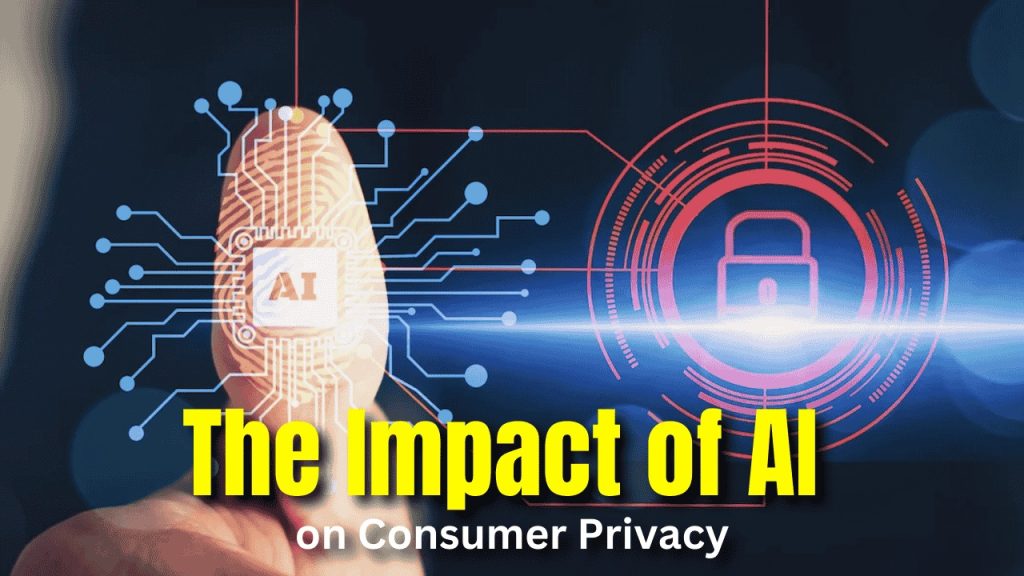
Artificial Intelligence (AI) is changing how businesses operate and how people interact with technology. It helps in making decisions, automating tasks, and providing personalized experiences. However, AI also raises concerns about consumer privacy. As AI systems collect and analyze vast amounts of data, the question of how this information is used and protected becomes critical. This article explores the impact of AI on consumer privacy, the risks involved, and how individuals and organizations can safeguard personal information.
How AI Affects Consumer Privacy
AI relies heavily on data to function effectively. Companies collect user data from various sources, such as social media, online shopping platforms, and smart devices. This data helps AI algorithms learn and improve, providing better consumer services. While this leads to more convenient and personalized experiences, it also creates privacy risks.
1. Data Collection and Surveillance
AI systems require large amounts of data, which often includes personal details like names, locations, preferences, and browsing history. Many companies track user behavior to improve their services, but this can sometimes lead to excessive surveillance. For example, social media platforms use AI to analyze user activities and provide targeted advertisements. While this can be beneficial for businesses, it raises concerns about how much companies know about their customers.
2. Lack of Transparency
One of the biggest concerns with AI and privacy is the lack of transparency. Many consumers are unaware of how their data is collected, stored, and used. Companies often have complex privacy policies that are difficult to understand. This makes it challenging for users to make informed decisions about their personal information.
3. Data Security Risks
AI systems store and process huge amounts of sensitive data, making them attractive targets for cybercriminals. Hackers can exploit vulnerabilities in AI systems to steal personal information, leading to identity theft and financial fraud. If organizations fail to implement strong security measures, consumer data can fall into the wrong hands.
4. Unintended Bias and Discrimination
AI algorithms are designed to make predictions and recommendations based on past data. However, if this data contains biases, AI systems can unintentionally discriminate against certain groups. For example, some AI-driven hiring tools have been found to favor certain demographics while rejecting others. This can lead to unfair treatment and privacy violations for individuals whose data is misused.
5. Third-Party Data Sharing
Many companies share consumer data with third-party organizations for marketing and research purposes. While some of these partnerships are legitimate, others may compromise consumer privacy. Users often have little control over how their data is shared, leading to concerns about unauthorized access and misuse.
Balancing AI Innovation with Consumer Privacy
Despite the risks, AI can be used responsibly to protect consumer privacy. Businesses and policymakers must work together to find a balance between technological advancements and data protection. Here are some ways to achieve this:
1. Stronger Data Protection Laws
Governments around the world are introducing stricter data protection laws to regulate AI usage. For example, the General Data Protection Regulation (GDPR) in Europe ensures that companies follow strict guidelines when collecting and processing consumer data. Similar laws in other countries can help protect user privacy and hold companies accountable for data breaches.
2. Ethical AI Development
Organizations should focus on ethical AI development by designing systems that prioritize consumer privacy. This includes using encryption techniques, anonymizing data, and implementing strict access controls. AI developers must also ensure that algorithms are fair and do not discriminate against any group.
3. Transparent Data Practices
Companies should be more transparent about their data collection methods and inform users about how their information is being used. Clear and simple privacy policies can help consumers understand their rights and make informed decisions. Providing options for users to control their data, such as opt-out features, can also enhance privacy protection.
4. Consumer Awareness and Education
Consumers play a crucial role in protecting their privacy. Understanding how AI works and being aware of potential risks can help individuals take control of their data. People should be cautious about sharing personal information online, regularly update their privacy settings, and use strong passwords to secure their accounts.
5. Responsible AI Usage by Businesses
Companies must adopt responsible AI practices to maintain consumer trust. This includes limiting the amount of data collected, securing databases, and ensuring compliance with privacy regulations. Businesses should also conduct regular audits to identify and address privacy risks.
Future of AI and Consumer Privacy
AI technology will continue to evolve, and so will the challenges related to consumer privacy. As AI becomes more advanced, new privacy risks may emerge. However, with proper regulations, ethical development, and consumer awareness, it is possible to harness the benefits of AI while protecting personal data.
Looking Ahead
AI has transformed various aspects of daily life, offering convenience and efficiency. However, it also raises significant privacy concerns. Companies, policymakers, and consumers must work together to ensure that AI is used responsibly. By implementing strong data protection measures, promoting transparency, and educating users, we can create a future where AI enhances lives without compromising privacy.













